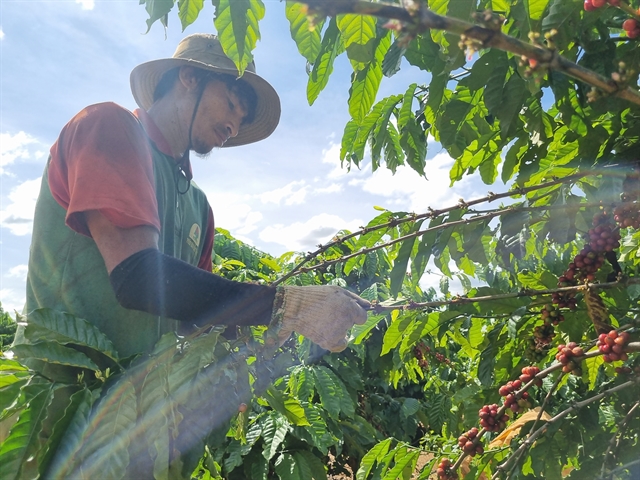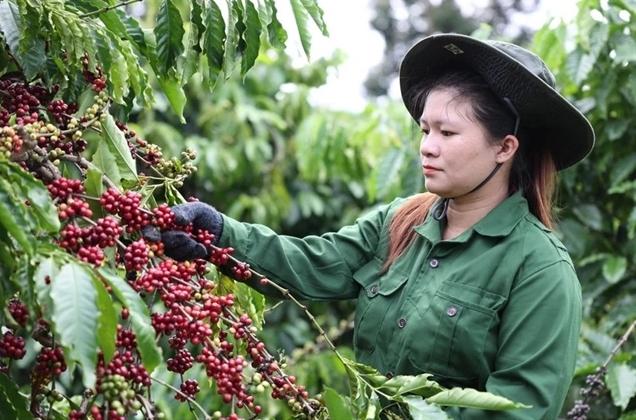 Economy
Economy

 |
| A worker harvests coffee in Đắk Lắk. — VNA/VNS Photo |
HÀ NỘI — The Ministry of Agriculture and Rural Development (MARD) and the Dutch Sustainable Trade Initiative (IDH) jointly organised a ceremony to transfer the results of the pilot implementation of the forest and coffee plantation database system.
Director General of the International Cooperation Department at MARD, Nguyễn Đỗ Anh Tuấn, said that the pilot offers a technical solution to help Việt Nam's coffee industry meet the stringent requirements of the European Union's Deforestation Regulation (EUDR).
The ministry is committed to working closely with local authorities, businesses and international organisations to complete, expand, update and maintain the system.
“The system will not only provide solutions to support traceability and ensure transparency in the coffee supply chain, but also lays the foundation for scaling to other agricultural sectors, paving the way for a transparent, responsible and sustainable agriculture industry,” Tuấn said.
From November 2023 to December 2024, IDH collaborated with businesses in the Cooperation Group (including domestic and international coffee companies) to develop the Forest and Coffee Plantation Database System.
At the handover ceremony, the EUDR Adaptation Cooperation Group officially transferred the database system to MARD, which will enable it to expand nationwide to other coffee-producing regions and affected agricultural sectors.
This initiative integrates existing data from state management agencies at the provincial and district levels, as well as plantation data provided by participating pilot enterprises.
The system allows companies with authorised access to use and extract information that complies with EUDR requirements, enabling efficient product traceability processes.
The database system enhances state management in monitoring forest resources and production areas. It also provides a reliable information platform for coffee trading and exporting companies, easing and speeding up information declarations, while saving costs compared to building independent systems.
Kaj van de Vorstenbosch from the Netherlands’ Ministry of Foreign Affairs highlighted the significance of effectively implementing EUDR in Việt Nam, which will allow access to EU markets, including the Netherlands, while promoting sustainable and deforestation-free production.
The development of this database is a crucial step, offering an effective and comprehensive solution to enhance transparency, smallholder participation and compliance requirements at a lower cost, he said.
With the close agricultural cooperation between the Netherlands and Việt Nam, public-private partnerships led by organisations like IDH are expected to drive significant progress, ensuring a sustainable future for Việt Nam’s coffee industry, according to the diplomat.
The biggest challenge for Vietnamese coffee exporters and farmers in complying with the EU's new regulations lies in identifying and detailing each plantation. This is essential to meet strict traceability requirements, proving that imported products were not cultivated on land converted from forests or causing deforestation after December 31, 2020.
Đỗ Ngọc Sỹ, JDE Peet's Regional Sustainability Manager in Asia and the Pacific, emphasised the company's commitment to building a database system with local authorities, supply chain businesses and coffee farmers.
"This effort will enable Việt Nam's coffee sector to meet the EUDR, foster sustainable development and bring prosperity to coffee growers," he said. — VNS




